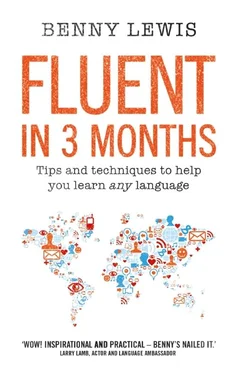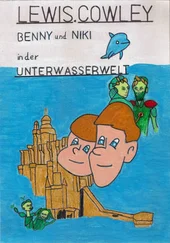Benny Lewis
Fluent in 3 Months
Tips and techniques to help you learn any language

INTRODUCTION
My Story, Your Passion
Your story, like mine, begins and ends with passion – the surest path to learning a new language.
In late July 2003, just a couple of weeks after my twenty-first birthday, I moved to Valencia, Spain. To help me adjust to life in a foreign country, I enrolled in a Spanish class.
It was a small class, and it was taught entirely in Spanish, which was a bit of a problem for me because I only understood English. I had just graduated with a degree in electronic engineering, and I had barely passed the German and Irish *courses I took in high school and college. Languages were definitely not my thing.
After several classes, I was getting absolutely nowhere. Each lesson ended with the other students wearing great big satisfied smiles on their faces. I knew they had figured out something about the language that they didn’t know before, while I still couldn’t understand a single thing. My ego was destroyed. I was, without a doubt, the worst student in the class, and as I walked home with my head hung low, I couldn’t help thinking, It’s not fair! Why were those guys blessed with the language-learning gene and I wasn’t? I’m never going to learn Spanish.
After six months in Spain, I could barely muster up the courage to ask how much something cost or where the bathroom was. I really started to think I would never learn Spanish. I began to worry my experience immersed in a different country would be a total failure. I was convinced my destiny was to spend the rest of my life speaking only English.
Fast-forward seven years. One night in Budapest, I ended up at a ‘couchsurfing’ party at a local bar with an international crowd. I confidently strolled in and said hello to everyone in Hungarian, one of the most notoriously difficult languages in the world. I started chatting with a local, in Hungarian, about my progress with his native language. I had been learning it only for about five weeks, but I was still able to have this rudimentary chat with him.
Next, I noticed a slight Brazilian Portuguese accent from the guy speaking English to my left. I asked, ‘Você é brasileiro?’ (Are you Brazilian?), and when he told me, in Portuguese, that he was from Rio, I immediately switched to my Carioca accent, using slang from his own city, telling him how much I missed it. He was shocked to hear an Irish guy speak his own Portuguese dialect in a random bar in Budapest!
Then I recognized a Spanish friend of mine across the table and immediately switched to fluent Spanish, asking her how her Hungarian was coming along. Later, a couple from Quebec arrived, and I turned on my Quebec accent and expressions while speaking French. We exchanged contact information and made plans to hang out the next day.
That night I also managed to use some Italian and Esperanto and wowed a Thai tourist with a few phrases of basic Thai, using all the right tones. I even flirted in German with a German girl I saw regularly at these meetings.
In one evening I spoke eight languages (including a little English) casually, socially, and naturally. I switched between them effortlessly, without mixing them up, and – more importantly – made some amazing new friends in the process.
Since then I’ve learned several other languages, and at the time of writing this, I can confidently use twelve languages in varying degrees of proficiency, from conversational Dutch, Mandarin, Chinese, and American Sign Language to certified mastery in Spanish and everything in between for the other nine. I understand the basics of another twelve languages on top of these. I also run Fluentin3months.com, the world’s largest language-learning blog, which, to date, has helped millions of people around the world learn a new language.
All of this is true despite the fact that I spoke only English until the age of twenty-one and did poorly in my attempts to learn languages in school.
How did this happen? How did I go from dropping out of my Spanish language class to being able to converse in more than a dozen languages? Simply by changing how I approach new languages.
The Way to Learn a Language Is to Live It
One of the biggest issues with a traditional approach to language-learning is that the benefits of picking up a new language are constantly postponed. Study this and study that and then, if you’re lucky, in a few years’ time, you’ll eventually understand the language. As well as being far from the truth, this approach removes the fun and the life from the process.
In many education systems, especially in English-speaking countries, languages are taught the same way as any other subject, like geography or history. Teachers provide the ‘facts’ (vocabulary) so the student will ‘know’ the language. Or, as in mathematics, students do the exercises to understand the ‘rules’ (grammar).
Except on rare occasions, this approach does not produce speakers of the target language, so something clearly needs to be fixed. A language is a means of communication and should be lived rather than taught.
A teacher’s primary role should be as a language facilitator. A teacher should make sure students use the target language at whatever level they happen to be at, rather than keep them quiet while he or she does all the talking, trying to transfer the informational components of the language into the students’ brains.
In high school, I had to learn Irish. It was mandatory and, in order to gain admission to university, I needed to pass my exams. As a result, I only cared about learning enough Irish to pass; I didn’t care about the language itself.
My attitude towards Irish changed completely when I actually took the time to live in the Gaeltacht region of Ireland, where people still speak the language, and I started to make friends using it.
The second language I took in high school was German. I took German because Germany is an important economy in Europe, and I figured it would look good to have this language on my CV. German language skills would help me stand out, especially since most people in my year were studying French. Once again, I didn’t care about the German language; I just thought learning it might give me secondary benefits. And, of course, I barely retained anything. I thought German was nothing more than der, die, das tables of impossible-to-learn grammar. And I imagined Germans were robots that automatically spit out grammatically-correct sentences.
That is, until I met actual Germans and saw firsthand how interesting and fun they were. So fun, in fact, I wanted to get to know them better. This way of thinking allowed me to stop thinking of the German language as a barrier between Germans and me, but instead as a bridge I could cross to communicate with them. In both cases, my initial tangential motivations for learning a language were replaced by a direct motivation to live that language and use it as a means of communication and connection.
This is how language courses should work. The best tend to veer away from the traditional approach of drilling grammar and word lists into us, or providing us with old, boring, and irrelevant texts. Instead, the best courses encourage us to play games and role-play in the language. They let students speak the language with one another, which – as I realized with both of the languages I had learned poorly in high school and then much better as an adult – is the truest means of communication. As a result of speaking the language right away, students start to acquire the language rather than learn it as they would other academic subjects.
Читать дальше













